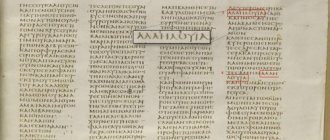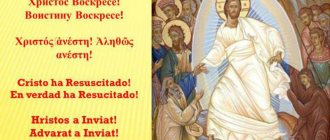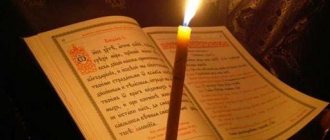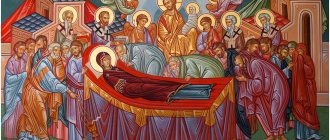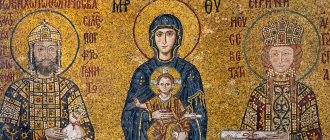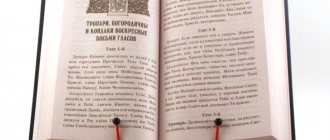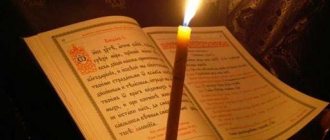About the mental benefits of reading the canons
A Christian receives great benefit by praying the canons. They spiritually enlighten the believer and reveal to him the heights of theology. Spiritual authors have captured in each canon the inexhaustible treasures of the Christian faith. Anyone who carefully prays the canons constantly draws from them more and more Divine truths related to our eternal salvation. A Christian learns through the canons the immeasurable depth and breadth of God’s love for people, the sacred history of the Old Testament and New Testament Churches, high examples of Christian morality and many other soul-saving edifications. These sacred chants give tenderness and meekness to those praying, drive away despondency, sadness, cowardice, eradicate sinful thoughts, dispel doubts, confirm faith, and fill hearts with joy in the Lord.
In order for the holy canons to become the desired spiritual food for the soul, it is necessary to cleanse oneself from sinful defilement by fasting, prayer, tearful contrition for sins, and the holy sacrament of Repentance. There are believers who pray only the canons to St. Nicholas (in the hope of having good luck in temporary life), St. Paisius the Great (for deliverance from eternal torment of those who died without repentance), as well as the canons: general for the dead and for the same-dead (one-dead). The rest of the canons are of little interest to them. This attitude towards the holy canons is wrong . You may not achieve the desired goal in your prayer if you neglect the canons of the Most Holy Trinity, Our Lord Jesus Christ, the Most Holy Theotokos, the angels, the holy saints of God, church holidays, etc. Whoever prays the canons with zeal, generously receives Heavenly mercies by participating in the liturgical life of the Holy Church. His life begins to flow along the church channel leading to the Heavenly world. The saints continually offer prayers to God for him, with whom he enters into close prayerful communication.
If at first the content of the Church Slavonic text is completely incomprehensible to you, then for this reason you should not stop reading the canons. On the contrary, you need to pray the canons more often and more diligently, and the Lord will be a constant Helper in your good deeds. God will answer your prayer if it is sincere and ardent and comes from the depths of your heart, even when you do not yet understand its Slavic expression. You just need to have a desire to comprehend the text, translate it using a Church Slavonic dictionary, and think about the content. Over time, you will experience joy and spiritual tenderness from prayer; words that previously seemed unusual will gradually become the sweetest Divine meal in your spiritual life. Before prayerfully reading the canons, you must familiarize yourself with all the explanations, instructions and footnotes related to the statutory order. Anyone who even begins to pray the canons for the first time will be able to figure out their sequence without any difficulty. It is useful for beginners to first read out loud several times slowly an unusual Slavic text. Try to constantly enrich your memory with the sacred content of the canons.
good news
The Feast of the Annunciation is one of the most revered in Orthodoxy. It is celebrated. Church services on this day are especially joyful, upbeat, the parishioners in the churches have illuminated faces, and the kontakion of the Annunciation in honor of the Mother of God sounds from the choir with truly angelic voices. It is called “The Chosen Voivode...” and is distinguished by its touching beauty and tenderness before the Great Sacrament. The words of the kontakion are filled with jubilation and respect, sincere hope, in which people’s request to the Most Pure Mother is heard to intercede for us sinners. In addition to religious, works of this genre have important literary and artistic significance.
Brief explanation of terms and abbreviations related to canons and prayers
All canons in the section are set out in relation to home prayer without a priest, and therefore the text of the Gospel and other prayers of the priest are not published.
Glory - where it says “Glory”, then you need to read: glory to the Father and the Son and the Holy Spirit.
And now - where it is written “And now”, then you need to read: both now and ever and forever and ever, Amen.
Bow - whenever “bow” is indicated in parentheses, we make the sign of the cross and bow our heads to waist level.
Troparion is a special hymn read before the canon, which in brief words contains either praise to the saint, or reveals the greatness and image of his spiritual state, or a concise description of his life.
Kontakion - read according to the 6th song of the canon and contains a brief praise of the saint or a brief narrative about the sacred event of the holiday.
Ikos is a special chant after kontakion, briefly characterizing a holiday or a saint.
Sedalen - read from the 3rd song of the canon and contains a brief praise of a saint or holiday.
Irmos is the first verse in each song of the canon, which is sung in a special tune. The content reveals various moments of the Old Testament Church history, as well as touching petitions to the Almighty and the saints.
Chorus - before each verse in the song of the canon, a short prayer address to the saint to whom the canon is read. For example: “Reverend Father Sergius, pray to God for us.” Where in the canons it is written: “Chance”, then you need to read the words of the chorus, placed after the irmos of the first song.
Theotokos - in each canon, the last verse of each song of the canon is dedicated to the Theotokos. In some canons, the Savior also has “Theotokos”.
Katavasia - in prayer canons it is sung after each song, as an enhanced prayer-petition to the saint to whom the canon is read.
Zadostoinik - after the 9th song of the canon, a prayer to the Most Holy Theotokos with a request to accept our spiritual work.
Introduction to Kontakia
Let's figure it out, kontakion - what is it? This was the name given in Greece, more precisely in the Byzantine Empire, to solemn hymns dedicated to the Mother of God, the feast of the Nativity of Christ, and various saints. Church songs were, as a rule, of sublime, pathetic content and glorified the clergyman in question. So, what is kontakion? A song of praise with religious content. It was created according to certain rules and had a strictly regulated form of execution. The first authors used the syllabic system of versification, achieving a clear rhythm in the poetic text to make it easier and more convenient to sing. The stanzas were supposed to contain teachings and instructions for the flock. They were pronounced from the pulpit by the priest. And the chorus (refrain) was sung by the choir of singers and the people present in the church.
The beginning is common to all canons
Small, seven-bowed began. It is always performed at the beginning and at the end of church and home prayers.
God, be merciful to me, a sinner (bow). Create me, Lord, and have mercy on me (bow). Without number of sins, Lord, have mercy and forgive me, a sinner (bow).
It is worthy to eat, as you are truly blessed, the Mother of God, ever blessed and most blameless, and the Mother of our God. We magnify the most honorable cherub and the most glorious seraphim, without the corruption of God the Word, the real Mother of God Thee (bow to the ground).
Glory to the Father and the Son and the Holy Spirit (bow). And now and ever and forever and ever, amen (bow). Lord have mercy, Lord have mercy, Lord bless (bow).
Lord Jesus Christ, Son of God, prayers for the sake of Your Most Pure Mother, by the power of the Honest and Life-Giving Cross, and my holy guardian angel, and for the sake of all the saints, please Love and save me, for I am Good and Lover of Mankind, Amen (bow to the ground without the sign of the cross).
God, be merciful to me, a sinner (bow). Create me, Lord, and have mercy on me (bow). Without number of sins, Lord, have mercy and forgive me, a sinner (bow).
According to the usual beginning, the layman says:
For the prayers of the saints, our fathers, Lord Jesus Christ, Son of God, have mercy on us. Amen (bow).
Holy God, Holy and Mighty, Holy and Immortal, have mercy on us (three times, with bows). Glory to the Father and the Son and the Holy Spirit, now and ever and unto ages of ages, amen. Most Holy Trinity, have mercy on us. Lord, cleanse our sins; Master, forgive our iniquities; Saints, visit and heal our infirmities; for your name's sake. Lord have mercy (three times). Glory, even now.
Our Father, Who art in heaven. Hallowed be Thy name. Thy kingdom come. Thy will be done as it is in heaven and on earth. Give us our daily bread this day. And forgive us our debts, just as we forgive our debtors. And do not lead us into temptation. But deliver us from the evil one.
Lord Jesus Christ, Son of God, have mercy on us. Amen. (bow).
Lord have mercy (12 times). Glory, even now.
Come, let us worship the King our God (bow).
Come, let us worship Christ, the King and our God (bow).
Come, let us bow and fall before the Lord Jesus Christ Himself, the King and our God (bow).
Psalm 143. Lord, hear my prayer, inspire my prayer in Thy truth, hear me in Thy righteousness. And do not enter into judgment with Your servant, for no one living will be vindicated before You. For the enemy has driven away my soul, and has humbled my life to eat in the earth. He made me sit in darkness, like the dead of an age, and my spirit was sad within me, my heart was troubled within me. I have remembered the days of old, I have learned in all Your deeds, and in Your deeds I have learned Your hand. I lift up my hands to You. My soul is like a waterless land to You. Hear me soon, Lord, my spirit has disappeared. Do not turn Your face away from me, and I will become like those who go down into the pit. I hear you show me Your mercy in the morning, for I have trusted in You. Tell me, Lord, the way, but I will go, because I have taken my soul to You. Deliver me from my enemies, Lord, I have fled to You. Teach me to do Your will, for You are my God. Your good Spirit will guide me to the right land. For Thy name's sake, Lord, live me, by Thy righteousness remove my soul from sorrow. And consume Thy mercy unto my enemies, and destroy all my cold souls, for I am Thy servant.
Glory, even now. Alleluia, Alleluia, glory to You, O God (three times, with bows). Lord have mercy (12 times). Glory, even now.
God is the Lord and having appeared to us, blessed is coming in the name of the Lord.
Verse 1: Confess to the Lord that He is good, for His mercy endures forever.
Verse 2: They went around me, and in the name of the Lord they resisted them.
Verse 3: I will not die, but I will live and carry out the works of the Lord.
Verse 4: The stone, which they carelessly built, This was at the head of the corner, This came from the Lord, and is marvelous in our eyes (after each verse we say: God is the Lord).
The beginning of the canons is the same up to God the Lord and verses 1–4 inclusive, and then the order is as follows: the troparia of the canons are read, Psalm 50 and the canon (one or more) begins.
Often, zealous Christians pray not one, but two or more canons at the same time. Usually these are canons to the Lord Jesus (Lord's) and the Most Holy Theotokos (Theotokos) or to a saint. The choice of canons in home prayer is a personal matter and the diligence of each believer, but the order of reading them has its own rules. The Charter describes not only the order of reading the canons, but also the troparions, kontakia and sedals of the 3rd canto for each of them.
Kontakion today
Hymns composed in Orthodoxy according to the models of St. Romanus were of primary character until the 8th century. They were long, each with about 20-30 stanzas, separated by choruses. Performing them during services took a lot of time, which created some inconvenience. Therefore, from about the 8th century, the kontakion as a genre was replaced by the canon. However, this does not mean that hymns have ceased to be heard in cathedrals. They still performed the important function of glorifying and honoring the holiday for which they were written. There was just some modification of the genre. The meaning of the word “kontakion” in modern worship is as follows: these are 2 stanzas of solemn chant, performed together with ikos after the canons. The same term is used to refer to stanzas of akathists. Nowadays they usually sing the full kontakion only during funeral services for clergy. In other cases, they are limited to its truncated, shortened forms.
Order of reading the canons
All canons are different, but conditionally they can be divided into several types:
- The Lord's canons . These are the canons of the Lord Jesus (Savior), the Holy Trinity, the Cross and other Lord's holidays, which include: Easter, the Nativity of Christ, the Entry of the Lord into Jerusalem, the Transfiguration of the Lord, the Exaltation, the week of Thomas and others. Usually in such canons there is a chant for the holiday (for example, “Glory to the Lord, Thy Nativity”) or “Glory to Thee, our God, glory to Thee.”
- Theotokos canons . These are canons dedicated to the Most Holy Theotokos and the Mother of God holidays, such as: the Nativity of the Virgin Mary, the Annunciation, the Dormition, the appearance of the Kazan Icon and others. Usually in such canons the chant is “Most Holy Lady Theotokos, save us.”
- Canons of Saints . These are canons dedicated to the memory of saints.
Canons by rank:
- Savior (or Cross)
- Mother of God
- Archangels
- Angels
- Holy Prophet John the Baptist, Baptist of the Lord
- Apostles
- Prophets
- Hieromartyrs and Hieroconfessors
- Great martyrs and martyrs
- Saints
- Reverends
- For Christ's sake holy fools
- Righteous
Charter on troparions before the canon
Canon of the Lord and the Theotokos
When you pray together the canon to the Lord and the canon to the Most Holy Theotokos: the troparion of the canon to the Lord (twice). Glory, even now. Troparion of the canon to the Mother of God. According to the third song: kontakion and ikos of the canon of the Theotokos. Glory to the canon of the Lord. And now, the sedal of the canon to the Mother of God. According to the sixth song: kontakion and ikos of the canon to the Lord. If you eat two canons: the Savior (or Cross) and the saint (or Angel); say the troparion to the Savior twice. Glory: to the saint. And now: I will save. It’s the same with the Mother of God and the saint.
Canon of the Lord and the Saint (Theotokos and the Saint)
When you pray together the canon of the Lord and the canon of the saint (or the canon of the Theotokos and the canon of the saint): the troparion of the canon of the Lord (or the canon of the Theotokos) twice. Glory, troparion of the canon to the saint. And now, the troparion of the canon to the Lord (or the canon to the Theotokos). According to the third song: kontakion and ikos of the canon to the saint. Glory to the canon of the saint. And now, the canon of the Lord (or the canon of the Theotokos) is sedal. According to the sixth canon: kontakion and ikos of the canon of the Lord (or canon of the Theotokos).
Canon of the Lord, Theotokos and one or more saints
When you pray together the canon to the Lord, the canon to the Mother of God, one or more canons to the saints: the troparion of the canon to the Lord (twice), the troparion of the canons to the saints (how many canons you will read). Glory, troparion to the saint of the last canon. And now, the troparion of the canon to the Mother of God. According to the third song: kontakion and ikos of the canon of the Theotokos. Kontakia and ikos from the canons of saints. Sedal of the canon to the Lord. Sedalen from the canons of saints (how many canons you pray). Glory to the saint of the last canon. And now, the sedal of the canon to the Mother of God. According to the sixth song: kontakion and ikos of the canon to the Lord. If it happens to sing the feast of Christ (or the Cross), the Mother of God and the saint, then first say the troparion to the feast, twice. Also, Glory: to the saint. And now: Mother of God.
Canon of the Theotokos and one or more saints
When you pray the canon to the Mother of God and several canons to the saints: the troparion of the canon to the Mother of God (twice), the troparion of all, except the last, canons to the saints (how many canons you pray). Glory, troparion to the saint of the last canon. And now, the troparion of the canon to the Mother of God. (If the canon to the Theotokos contains two troparions, then on And now the second troparion to the Theotokos is read). According to the third song: we read the kontakia and ikos to the saints in order, as you pray the canons. Then the sedals are also in order. Glory to the saint of the last canon. Therefore, the troparion to the feast of Christ or the Mother of God, to which you wish to sing, say it twice. Glory, and now: still the same. If you eat two canons: the feast of Christ and the Mother of God, then say the troparion twice before the feast of Christ. Glory, even now: to the feast of the Mother of God.
Order of reading the catavasia
When you pray several canons at once, then after reading each song, the confusions of all the canons are read together in order, and only after the last confusion - Lord have mercy (three times with bows).
If the Savior, the Mother of God, the Angel and the saint: say the troparion to the Savior, the Angel, Glory: to the saint, And now: Theotokos (all in one).
If you eat only one saint, then say the troparion to the saint twice. Glory, even now: the Mother of God is resurrected according to the voice of the holy troparion. And now, the sedal of the canon to the Mother of God. According to the sixth song: kontakion and ikos of the canon of the Theotokos. (If the canon of the Theotokos contains two kontakia, then we read them in order, then the ikos).
When you pray two or more canons to the saints: the troparion of the canon to the first saint twice, we read the troparion of the remaining canons to the saints once. Glory, troparion of the last canon. And now, the Mother of God of the last canon. According to the third canon: kontakion and ikos of the second canon, third and others in order. Sedalene of the first canon and others in order. Glory, sedals of the last canon. And now, the Mother of God is his. According to the sixth song: kontakion and ikos of the first canon. Always, no matter how many canons are prayed, only the irmos of the first canon is read or sung. Before each verse, the chorus is read, which is placed in the first song of each canon. Only in the canon that is read last - in the last two verses it says - before the penultimate verse - Glory, before the last - And now.
After the troparia it is read.
Psalm 50. Have mercy on me, O God, according to Your great mercy. And according to the multitude of Your compassions, cleanse my iniquity. Above all, wash me from my iniquity and cleanse me from my sin. For I know my iniquity, and I will take away my sin before me. I have sinned and done evil before You alone. For you may be justified in your words and overcome without ever being judged. Behold, I was conceived in iniquity, and in sins my mother gave birth to me. Behold, you have loved the truth; You have shown me Your unknown and secret wisdom. Sprinkle me with hyssop, and I will be clean. Wash me, and I will be whiter than snow. Hear my joy and gladness, the humble bones will rejoice. Turn away Your face from my sins and cleanse all my iniquities. Create a pure heart in me, O God, and renew a right spirit in my womb. Do not turn me away from Your face and do not take Your Holy Spirit from me. Give me the joy of Your salvation and strengthen me with the Lord’s Spirit. I will teach the wicked your way, and wickedness will turn to you. Deliver me from blood, O God, God of my salvation; my tongue will rejoice in Your righteousness. Lord, open my mouth, and my mouth will declare Your praise. As if he had wanted a sacrifice, he would have given it; You do not favor burnt offerings. A sacrifice to God is a contrite spirit: God will not despise a contrite and humble heart. Bless Zion, O Lord, with Your favor; and let the walls of Jerusalem be built. Then be pleased with the sacrifice of righteousness, the offering and the burnt offering. Then they will place the calf on Your altar.
Lord Jesus Christ, Son of God, have mercy on us. Amen.
And the canon is read.
From the history of the term
We learn about how the kontakion genre arose and what it is from an ancient Christian legend. Once upon a time in Constantinople (5th-6th centuries), a God-fearing, sincerely religious man named Roman served at the Church of Our Lady. He was a true righteous man, which earned him the respect and goodwill of the then Patriarch Euthymius. And although Roman had neither hearing nor a voice, the patriarch asked him to serve him in the choir during ceremonial services. Envious people tried to disgrace the humble pastor. However, he humbly prayed to the Lord and the Mother of God, and a miracle happened. The Holy Virgin appeared to Roman and endowed him with a delightful voice and the gift of poetry. Inspiration descended on the servant of God, and he composed the first kontakion. You will understand what this is by reading the well-known lines of the solemn hymn in honor of Christmas, which begins with these words: “Today a virgin gives birth to the Most Essential...” Translated into the languages of all peoples who professed Christianity, the kontakion became a model of hymn-making. And Roman himself received the nickname of the Sweet Singer, and under this name he went down in history.
Charter on the sedalna according to the 3rd song of the canon
Therefore, the canon, whatever you please: a holiday or a saint.
It is appropriate for vedati: if you eat two or more canons, then we always sing the irmos only of the 1st canon, and leave the other irmos.
For the first canons, each troparion has its own chants; Glory, even now, is not said, but is said in the last canon to the last troparia; to the penultimate: Glory to the Father and the Son and the Holy Spirit; and to the last: And now and ever and unto ages of ages, amen.
We chant all the chaos of each canon and bow, and then sing again: Lord, have mercy (three times, with bows).
Decree on sedals, according to the 3rd song. Whenever you sing the canon to the Savior, the Cross and the Mother of God, one at a time: after Katavasia and the Lord, have mercy (three times, with bows): Glory, and now: sedalen (or ipaka), once. If you have two sedals, then you have one saddle; Glory, and now: others.
When there are two canons, the Savior (or the Cross) and the Mother of God: say kontakion and ikos (minor canon) to the Mother of God. Glory: saddle to Spas. And now: seated to the Mother of God. It’s the same with the Mother of God and the saint (or angel).
Also to the Savior (or Cross), the Mother of God, the Angel and the Saint: kontakion and ikos to the Mother of God; kontakion and ikos by the Angel; kontakion and ikos to the saint; sedalny Spasu; seated by Angel; Glory: sedal to the saint; And now: seated to the Mother of God.
Should the saint alone: sit with the saint, once; Glory, even now: the Mother of God (like others).
